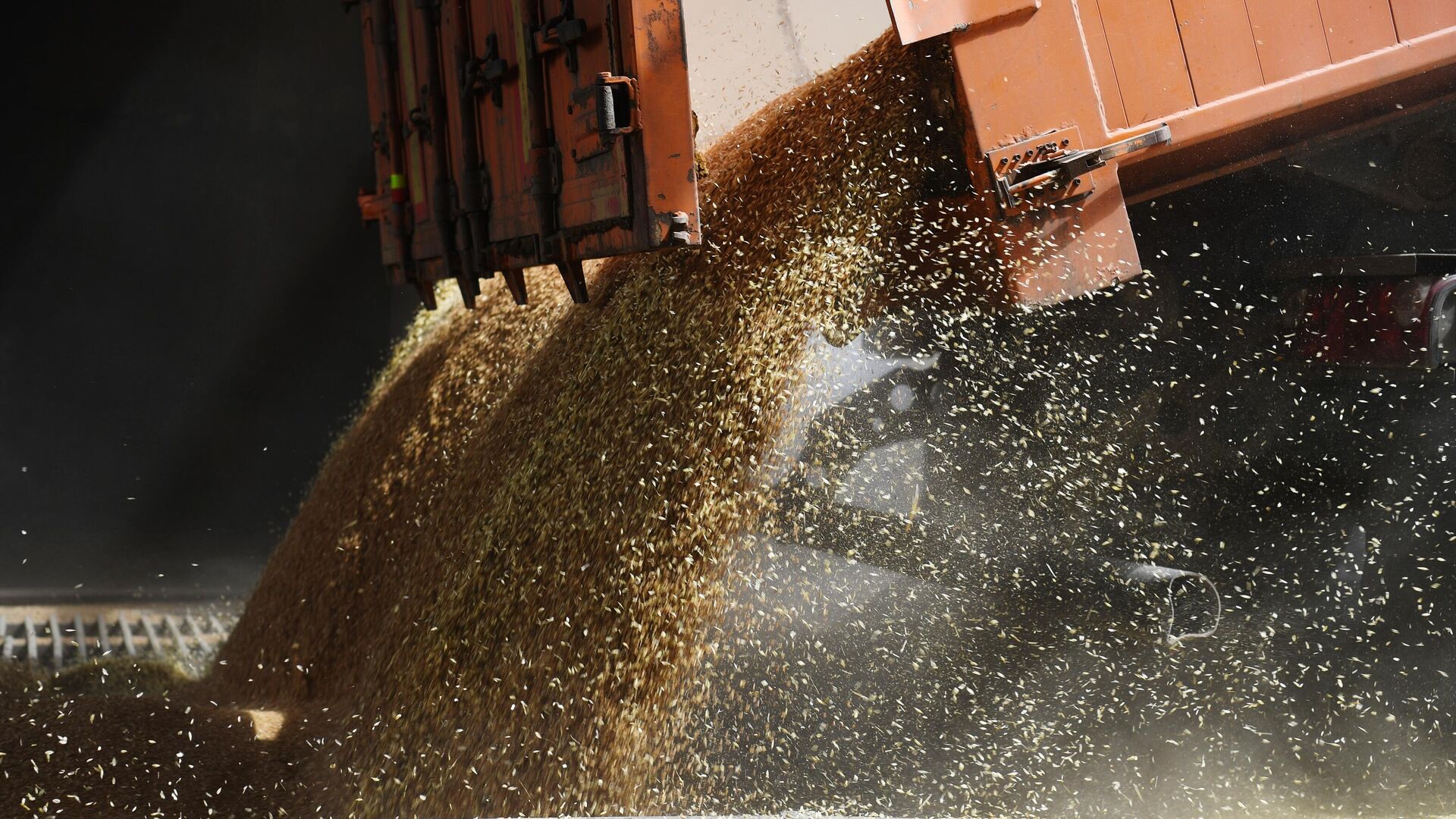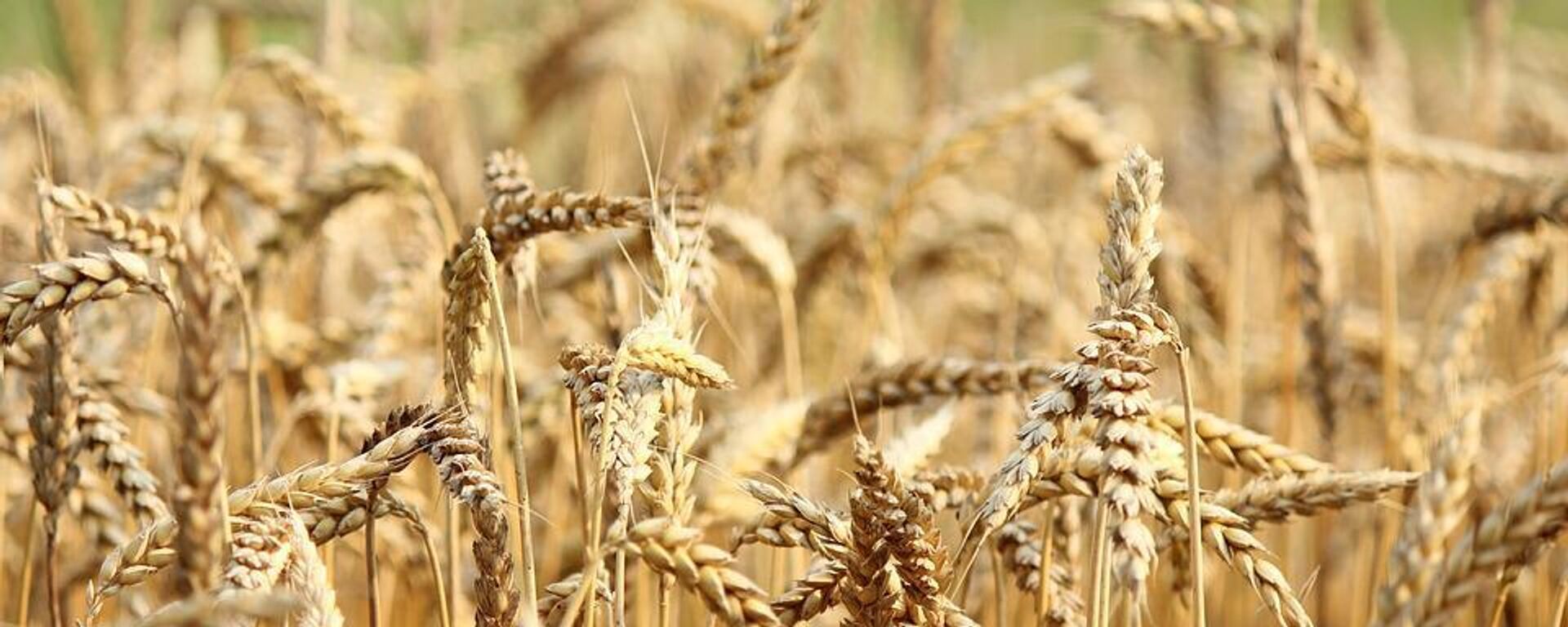https://sputnikglobe.com/20221102/how-west-skimmed-cream-from-grain-deal-and-then-derailed-it-1102944881.html
How West Skimmed Cream From Grain Deal and Then Derailed It
How West Skimmed Cream From Grain Deal and Then Derailed It
Sputnik International
Moscow suspended its grain deal with Kiev on October 29, following a Ukrainian attack on Russian vessels ensuring the safety of the humanitarian corridor... 02.11.2022, Sputnik International
2022-11-02T09:00+0000
2022-11-02T09:00+0000
2022-11-02T11:32+0000
analysis
us
opinion
russia
grain
ukraine
black sea
terror attack
crimean bridge
sevastopol
https://cdn1.img.sputnikglobe.com/img/07e6/07/0f/1097347705_0:139:3147:1909_1920x0_80_0_0_6d2fee74f6c26e489c72b51327a0fc08.jpg
"Russia [has] demand[ed] a cessation of any attacks on its Black Sea fleet in Sevastopol or at sea before reentering the grain deal," said Gilbert Doctorow, an International relations and Russian affairs analyst. "But another requirement will be the implementation of the parallel deal over freeing export of Russian grain and fertilizers that was part of the UN-facilitated agreements with Ukraine, but never happened."Earlier this week, the United Nations, Turkey, and Ukraine agreed not to plan any movement of vessels on November 2, as Russian President Vladimir Putin and his Turkish counterparts held talks on the situation around the grain corridor in the wake of Ukraine's drone strike on military and civilian vessels stationed in Sevastopol, Crimea.Putin told Erdogan that Moscow should get "real guarantees from Kiev about the strict observance of the Istanbul agreement, in particular about not using the humanitarian corridor for military purposes," before potentially resuming the deal, brokered by Turkey and the UN in July, 2022.After Moscow made an official announcement on October 29 that the deal was suspended, Turkey and the UN made an effort to proceed with implementing the accords nonetheless.On October 31, Russian officials drew attention to the fact that the prolongation of the deal is fraught with grave security risks. First, the terror attack on the Crimean Bridge prompted justified suspicions that bulk carriers with grain could have been used for transporting explosives by Ukrainian special services. Second, Kiev had no scruples about exploiting the humanitarian grain corridor for conducting a massive drone attack in the Black Sea.During his Monday presser in Sochi, Putin noted that under the grain deal, Moscow had guaranteed to ensure the security of the passage of vessels, which become impossible after Kiev's drone attack. "If, pardon me for the expression, Ukraine strikes [cargo and civilian] ships, we will be 'guilty,'" he said.Zakharova emphasized that the October 29 sabotage attack was carried out by Kiev in concert with NATO member states. She noted that British specialists were involved in the incident, while US military equipment was spotted in the area on the eve of the terrorist attack.West's 'Propaganda Charade'Meanwhile, the US and its NATO allies have raised the alarm over Russia's suspension of the deal, accusing it of "weaponizing food again," while the EU and NATO have demanded that Moscow rejoin the accords.Meanwhile, developed states have capitalized tremendously from the deal by receiving the lion's share of agricultural products shipped through the grain corridor, even though the initiative was aimed at helping the starving countries of the Global South. For instance, needy countries such as Somalia, Ethiopia, Yemen, Sudan, and Afghanistan received just 3% of the food, primarily through the UN World Food Program. At the same time, for some categories of agricultural products - rapeseed, corn, and soybeans - EU countries received from 60% to 100% of supplies from Ukraine.West Hasn't Been Interested in Deal, Pursued Own InterestsOn November 2, Maria Zakharova accused the West of turning the grain deal from a humanitarian operation into a commercial activity that ensures the interests of its own companies. According to Zakharova, the US and its European allies are openly manipulating statistics to persuade the world that the deal's provisions had been implemented. Earlier this week, US State Department spokesman Ned Price claimed that developing countries had received "two thirds of wheat," referring to UN reports. "It has been critical to get aid to the world’s neediest people. And Russia, and Russia alone, is now directly standing in the way of that," insisted Price.However, the State Department spokesperson somehow failed to mention that the second part of the deal, on ensuring the flow of Russian grain and fertilizers, was never implemented. The West continues to block Russian food exports – which substantially exceed the whole volume of Ukraine's agricultural products – from world markets, thus exacerbating the ongoing food crunch.It appears that the West was not interested in Russia playing a major role in the grain deal from the outset: on July 25, just three days after the UN-brokered deal was signed, US Agency for International Development (USAID) administrator Samantha Power told the US press that Washington was working on "Plan B" to get agricultural products out of Ukraine. According to her, the plan included road, rail, and river. She "justified" the necessity of the US-led plan by alleged attacks on Odessa's port by Russia. Kiev's subsequent attacks on Russian civilian infrastructure and vessels in the Black Sea and with the West's tacit approval and, purportedly, direct assistance once again demonstrated that the US and its NATO allies did not care much about preserving the accords.The responsibility for the suspension of the grain deal lies with the West, according to Tiberio Graziani, an Italian political scientist and analyst as well as president of the International Institute for Global Analysis Vision.
https://sputnikglobe.com/20221031/why-did-russia-leave-grain-deal-and-whos-to-blame--1102875661.html
https://sputnikglobe.com/20221101/russia-to-donate-wheat-fuel-to-lebanon-after-suspending-grain-deal-lebanese-minister-says-1102909629.html
russia
ukraine
black sea
crimean bridge
sevastopol
turkiye
Sputnik International
feedback@sputniknews.com
+74956456601
MIA „Rosiya Segodnya“
2022
News
en_EN
Sputnik International
feedback@sputniknews.com
+74956456601
MIA „Rosiya Segodnya“
Sputnik International
feedback@sputniknews.com
+74956456601
MIA „Rosiya Segodnya“
us, opinion, russia, grain, ukraine, black sea, terror attack, crimean bridge, sevastopol, turkiye, the united nations (un)
us, opinion, russia, grain, ukraine, black sea, terror attack, crimean bridge, sevastopol, turkiye, the united nations (un)
How West Skimmed Cream From Grain Deal and Then Derailed It
09:00 GMT 02.11.2022 (Updated: 11:32 GMT 02.11.2022) Moscow suspended its grain deal with Kiev on October 29, following a Ukrainian attack on Russian vessels ensuring the safety of the humanitarian corridor arranged by Russia in the Black Sea.
"Russia [has] demand[ed] a cessation of any attacks on its Black Sea fleet in Sevastopol or at sea before reentering the grain deal," said Gilbert Doctorow, an International relations and Russian affairs analyst. "But another requirement will be the implementation of the parallel deal over freeing export of Russian grain and fertilizers that was part of the UN-facilitated agreements with Ukraine, but never happened."
Earlier this week, the United Nations, Turkey, and Ukraine agreed not to plan any movement of vessels on November 2, as Russian President Vladimir Putin and his Turkish counterparts held talks on the situation around the grain corridor in the wake of Ukraine's drone strike on military and civilian vessels stationed in Sevastopol, Crimea.
Putin told Erdogan that Moscow should get "real guarantees from Kiev about the strict observance of the Istanbul agreement, in particular about not using the humanitarian corridor for military purposes," before potentially resuming the deal, brokered by Turkey and the UN in July, 2022.
After Moscow made an official announcement on October 29 that the deal was suspended, Turkey and the UN made an effort to proceed with implementing the accords nonetheless.
On October 31, Russian officials drew attention to the fact that the prolongation of the deal is fraught with grave security risks. First, the terror attack on the Crimean Bridge prompted justified suspicions that bulk carriers with grain could have been used for transporting explosives by Ukrainian special services. Second, Kiev had no scruples about exploiting the humanitarian grain corridor for conducting a massive drone attack in the Black Sea.
During his Monday presser in Sochi, Putin noted that under the grain deal,
Moscow had guaranteed to ensure the security of the passage of vessels, which become impossible after Kiev's drone attack. "If, pardon me for the expression, Ukraine strikes [cargo and civilian] ships, we will be 'guilty,'" he said.
"The essence of the issue is not the extension of the grain deal, nor its freezing, nor the postponement of our participation in this process, but at the center of everything is the violation by the Kiev regime of its obligations to restrain itself from extremist activities," Russian Foreign Ministry spokeswoman Maria Zakharova said on Radio Sputnik on November 2.
Zakharova
emphasized that the October 29 sabotage attack was carried out by Kiev in concert with NATO member states. She noted that British specialists were involved in the incident, while US military equipment was spotted in the area on the eve of the terrorist attack.
West's 'Propaganda Charade'
Meanwhile, the US and its NATO allies have raised the alarm over Russia's suspension of the deal, accusing it of "weaponizing food again," while the EU and NATO have demanded that Moscow rejoin the accords.
"[It is a] propaganda charade from the very start," said Doctorow. "The US and EU raised hysterical alarm over the famine and starvation that the blockage of Ukrainian grain exports [the military actions] might cause. That was an empty charge and remains so today. Famine and starvation in the poorer countries was well underway before the special military operation was launched due to other issues, including the post-COVID logistics snafus and unavailability of shipping or sharp rise in shipping costs. Do not look for truth in what has been fabricated in Washington and Brussels as an information war against Russia."
Meanwhile, developed states have capitalized tremendously from the deal by receiving the lion's share of agricultural products shipped through the grain corridor, even though the initiative was aimed at helping the starving countries of the Global South. For instance, needy countries such as Somalia, Ethiopia, Yemen, Sudan, and Afghanistan received just 3% of the food, primarily through the UN World Food Program. At the same time, for some categories of agricultural products - rapeseed, corn, and soybeans - EU countries received from 60% to 100% of supplies from Ukraine.

1 November 2022, 10:14 GMT
West Hasn't Been Interested in Deal, Pursued Own Interests
On November 2, Maria Zakharova accused the West of turning the grain deal from a humanitarian operation into a commercial activity that ensures the interests of its own companies. According to Zakharova, the US and its European allies are openly manipulating statistics to persuade the world that the deal's provisions had been implemented. Earlier this week, US State Department spokesman Ned Price claimed that developing countries had received "two thirds of wheat," referring to UN reports. "It has been critical to get aid to the world’s neediest people. And Russia, and Russia alone, is now directly standing in the way of that," insisted Price.
However, the State Department spokesperson somehow failed to mention that the second part of the deal, on ensuring the flow of Russian grain and fertilizers, was never implemented. The West continues to block Russian food exports – which substantially exceed the whole volume of Ukraine's agricultural products – from world markets, thus exacerbating the ongoing food crunch.
The US and EU refused to ensure evenhanded implementation of commitments to facilitate Russian grain and fertilizer exports, Doctorow underscored. They have not ended the impediments to payment for Russian grain sales by lifting sanctions on the banks involved, as well as sanctions on transportation and port services, according to the scholar.
It appears that the West was not interested in Russia playing a major role in the grain deal from the outset: on July 25, just three days after the UN-brokered deal was signed, US Agency for International Development (USAID) administrator Samantha Power told the US press that Washington was working on "Plan B" to get agricultural products out of Ukraine. According to her, the plan included road, rail, and river. She "justified" the necessity of the US-led plan by alleged attacks on Odessa's port by Russia. Kiev's subsequent attacks on Russian civilian infrastructure and vessels in the Black Sea and with the West's tacit approval and, purportedly, direct assistance once again demonstrated that the US and its NATO allies did not care much about preserving the accords.
The responsibility for the suspension of the grain deal lies with the West, according to Tiberio Graziani, an Italian political scientist and analyst as well as president of the International Institute for Global Analysis Vision.
"The [suspension of the grain deal] indirectly demonstrates once again that the crisis between Ukraine and the Russian Federation is a crisis between the US-led West and Moscow," said Graziani. "The negotiation will be possible only if Washington speaks directly with Moscow: everything else, the sabotage of the gas pipelines, the explosion of the bridge and now the attack on civilian ships, is a constitutive part of the Kiev strategy to compromise negotiation actions that may emerge from agreements mediated by Turkey and the UN."






